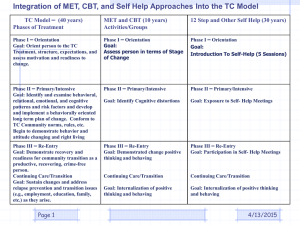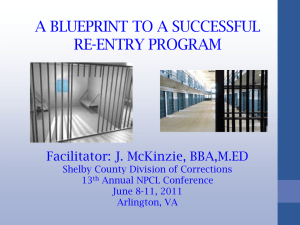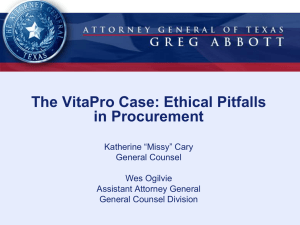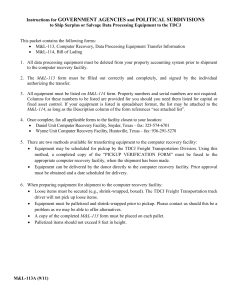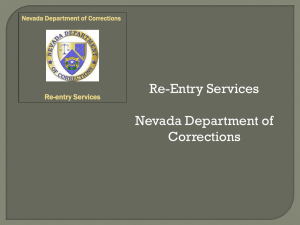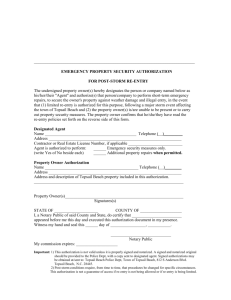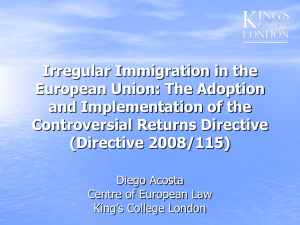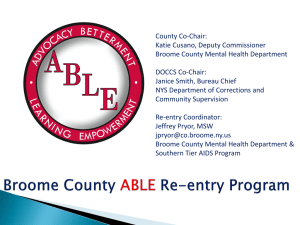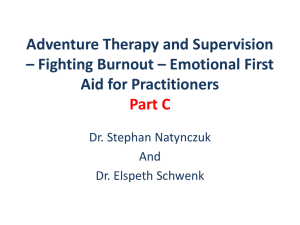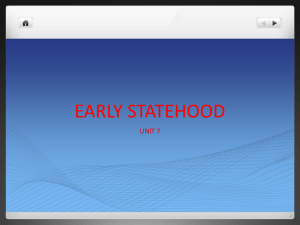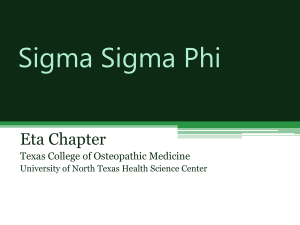Most Recent Legislative Session - Texas Criminal Justice Coalition
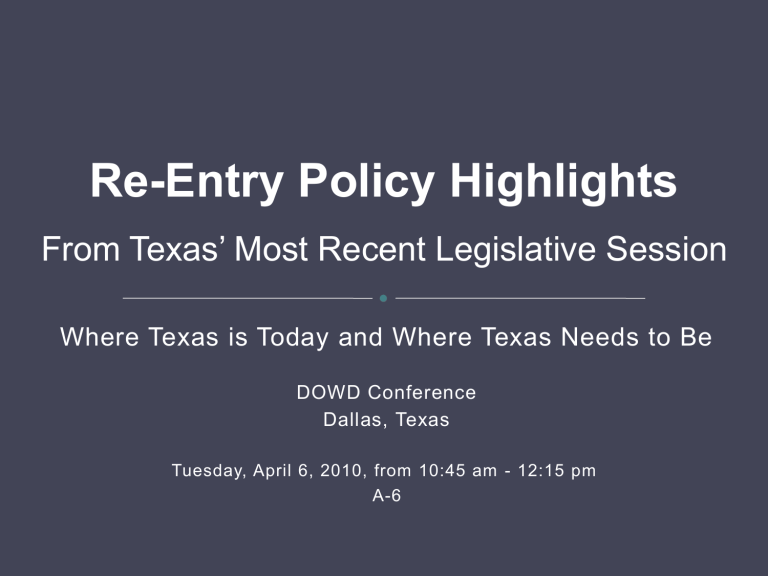
Re-Entry Policy Highlights
From Texas’ Most Recent Legislative Session
Where Texas is Today and Where Texas Needs to Be
DOWD Conference
Dallas, Texas
Tuesday, April 6, 2010, from 10:45 am - 12:15 pm
A-6
Historical Bipartisan Support
This session, policy-makers made an historic, bipartisan showing of support for policies that will assist men and women in their re-integration efforts, providing those who are returning to our communities with the resources for personal responsibility that will more successfully avert them from the criminal justice system in the future.
With the tools to effectively and healthily manage their lives, formerly incarcerated individuals will be empowered to participate in society in a fulfilling and productive way, to the benefit of public safety, family cohesion, local economies, and public health.
FY 2009 Release Statistics:
Primary Counties and Release Status
HARRIS
15,287
(54% Discharge
46% Supervision)
ALL OTHER
COUNTIES
52%
DALLAS
7,432
(47% Discharge
53% Supervision)
Harris - 21%
Dallas - 10%
Tarrant - 7%
Bexar - 6%
Travis - 4%
All Other Counties - 52%
TRAVIS
2,872
(58% Discharge
42% Supervision)
BEXAR
4,681
(47% Discharge
53% Supervision)
TARRANT
5,132
(46% Discharge
54% Supervision)
Total Releases = 72,218
Key Components for Re-Entry
Statewide Reintegration Plan
Re-entry Task Force (State Level)
Re-entry Efforts (Local Level)
Personal Identification Documents
Increased Employment Opportunities
Housing
Educational Resources
Improved Efficiency
Future Efforts
Comprehensive Statewide Re-Entry Plan
HB 1711 (S. Turner, Guillen, A. Martinez, Veasey, Marquez);
Creates a comprehensive statewide reintegration program for individuals transitioning from prison back into our communities.
Note: An amendment was added to this bill that established the
Texas Reentry Task Force. This Task Force is comprised of members of state agencies, members of community groups, and concerned citizens. Its goal is to identify gaps in services and coordinate with providers of existing local re-entry services to provide exiting individuals with a successful return to society.
Personal Identification
HB 2161 (S. Turner, Marquez); Gives individuals re-entering society a personal identification certificate provided by TDCJ, allowing individuals to more easily obtain an ID or drivers license. – Signed by the Governor!
Increased Employment Opportunities
HB 963 (Guillen); Allows formerly incarcerated individuals to confirm their eligibility status for an occupational license before committing to and preparing for an educational program. –
Signed by the Governor; effective immediately!
Note: This bill includes an amendment that will increase employment opportunities for nonviolent, non 3-g offenders if they are eligible to obtain an occupational license and if their past crime is not related to the occupational license they are seeking to obtain.
Housing
HB 3226 (Madden, Edwards, McReynolds, Christian);
Establishes a housing voucher program to address the lack of housing that many paroled individuals face when leaving prison.
– Signed by the Governor; effective immediately!
The housing program applies to individuals who have been approved for parole or mandatory supervision but who are awaiting a halfway house placement. It allows TDCJ to provide payment vouchers for temporary housing, food, clothing, and hygiene products for community-based housing in the county of the individual’s release, rather than requiring him or her to wait for a TDCJ-sponsored halfway house to become available. The amount of payment issued through the housing voucher may not exceed the cost that TDCJ would pay to incarcerate an individual for the same time period that the voucher is issued for.
Educational Resources
HB 3649 (Marquez, Hodge, Madden): Allows certain non-profit, religious, or civic organizations to send inmates books and educational materials. – Signed by the Governor; effective immediately!
Improved Efficiency
HB 2289 (Madden, McReynolds, Marquez): Requires TDCJ to release a prison inmate from either the facility in which s/he served the sentence or a regional release facility nearest to the facility in which s/he served the sentence. – Signed by the
Governor!
Shaping the Future of Re-Entry
In Texas
Eliminating Barriers to Re-Entry
Explore the impact of statutes and the use of criminal background checks in areas of housing and employment.
